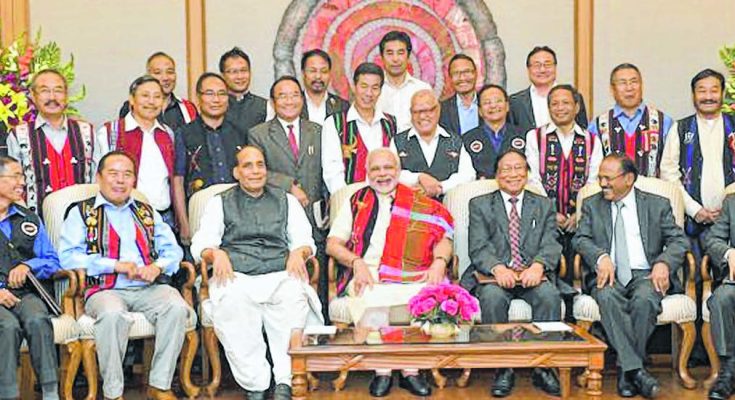 NEW DELHI Jan, 22 : The two-and-a-half-month long economic blockade in Manipur imposed by the United Naga Council (UNC) is seen as a sign of the Government of India’s failure to strike an amicable conclusion to Naga peace talks, an initiative that was publicised with much fanfare.
NEW DELHI Jan, 22 : The two-and-a-half-month long economic blockade in Manipur imposed by the United Naga Council (UNC) is seen as a sign of the Government of India’s failure to strike an amicable conclusion to Naga peace talks, an initiative that was publicised with much fanfare.
Though the government had recently sent 4,000 para-military troops to counter the economic blockade, it could hardly be of any help in controlling the situation. Rather the situation has turned worse as the UNC decided to intensify the blockade just after the date of Assembly election was announced.
When asked if the organization is likely to soften its blockade to facilitate the election process, Milan Shimray, an UNC leader said to Firstpost in a terse statement, “We do not prioritise the election, but we prioritise the issue of integrity of the ancestral land of the Nagas.”
George Gwaitye, a Kuki leader in Manipur said to Firstpost that the Election Commission might face difficulties in holding free and fair elections in some areas of Manipur. “The elections are likely to be free and fair in areas thickly populated by Kukis. But it is unlikely to be the same in the areas where National Socialist Council of Nagaland – Isak-Muivah (NSCN-IM) dominates,” he said.
Even the Election Commission of India is worried about the uncertainty that has cropped up due to the economic blockade reports DNA. Quoting sources in the commission, the report says that the Constitutional body thinks it might face logistical problems in transporting of manpower and equipment to 30 of the 60 Constituencies in the State.
The blockade has also crippled the election campaign of the political parties. N Biren a leader who recently switched to BJP from Congress, is finding it difficult to campaign for the party as the blockade has resulted in scarcity of petrol in the State. “We have to use vehicles in our campaign. But since fuel is not easily available, it has become difficult for us to do that. I hope the Centre will definitely come up with a solution to the blockade,” he said.
The issue of ancestral land of the Nagas resurfaced prominently just before the Assembly election, on account of the Manipur Government’s decision to create seven districts, by bifurcating a few of the Naga-dominated ones. Though the move purportedly made to facilitate administrative convenience went down well with the other tribes and ethnic groups of the State, Nagas opposed it vehemently, dubbing it as a step to divide the Nagas and their land.
In a press statement the UNC said that it sees this decision as arbitrary and bifurcation of Naga land without their knowledge and consent. Protesting the creation of Sadar Hills and Jiribam district, it further said that the land and the Nagas are inseparable and Nagas, being owners of their land, will not let anyone decide for them. This statement was seen to be informed by the long-term demand for a greater Nagaland by uniting Naga inhabited areas of Manipur, Assam and Arunachal, made by the insurgent group NSCN(IM), with which the Government of India has entered into the memorandum of agreement for peace talks.
Further, striking a chord similar to that of the NSCN (IM), the UNC sought “Political intervention from the Government of India…to settle the Indo-Naga political issue once and for all for it is impossible for the Nagas to live under the oppressive and hegemonic communal Government of Manipur.” Since RN Ravi, the architect and the interlocutor of the talks decided to go mum, very little is known about the stand the memorandum of agreement takes on the issue of territorial integrity of Manipur. This has led to heightening of ethnic tensions with Nagas on one side and the Kukis and Meiteis on the other.
In contrast to the popular expectation among the Nagas that the demand for unification of Nagas dwelling in the neighbouring States would find its place in the memorandum of agreement, the other ethnic groups have hoped that the peace accord would not agree upon issues crossing the territorial limits of Nagaland. It was expected that the content of the accord would be made public since it involved the question of territorial integrity of the concerned States. But it remained unknown even after being signed a year and a half ago.
Protracted silence on the part of Government of India even in the face of the NSCN(IM) and UNC repeatedly claiming that the demand for a greater Nagaland has not been given up raises serious questions on the Government’s intentions. Is the silence on the peace talks on the part of the Government prompted by the demand for a greater Nagaland ? Or is it a mere tactic to keep the people of Manipur in the dark about any compromise made on the territorial integrity of the State before Assembly elections ? Even the attempts made by the BJP to persuade the public fell short as the Government remained silent. Thus a Naga accord intended to end the country’s oldest insurgency became the reason of BJP’s undoing in Manipur.
The Centre’s helplessness was felt even when a group of civil society organisations from Manipur recently met the Home Minister in Delhi, urging him to solve the crisis caused by the economic blockade. The Home Minister was seen expressing concern and assuring the people to provide with further security forces, turning away from the burning issue of the Naga peace talks.
If one remembers the heydays of the peace accord signed on 3 August 2015, the ruling party was at a loss when the Congress vice-president Rahul Gandhi took on the Government in Parliament, alleging that even Union Home Minister Rajnath Singh was kept in the dark about the content of the agreement. The Home Minister, otherwise eloquent, was seen grappling for a convincing reply.
During the peace process, the NSCN(IM) fortified its presence in the Naga-dominated areas of the North-East India. In an article published in Firstpost it was reported that the NSCN(IM) also increased its cadre strength to 5,000 after signing the peace talks on account of the unrealistic promises made by the interlocutor to rehabilitate them into the BSF; thus frustrating the very purpose of bringing peace to the region.
Source: The Sangai Express




Imposed Public Curfew on “ECONOMIC BLOCKADE ” for a minimum of 120 days counting wef 1st November 2016 with immediate effect from this midnight, day the 23rd January 2017. TOTALLY BANNED “SIT-IN-PROTEST, DISCUSSION ON ISTV, IMPACT NEWS OR PUTTING UP AS AGENDA MATTER FOR ALL POLITICAL PARTIES”. by – ANTI BLOCADE COMBINED DEMOCRATIC EFFECTIVE FRONT(ABCDEF).